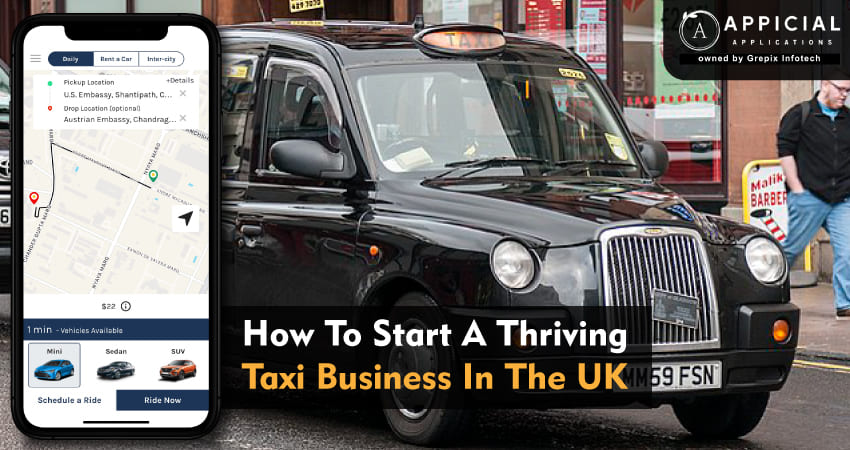
How To Start A Thriving Taxi Business In The UK
Launching a successful taxi business in the UK is a challenging yet potentially rewarding venture, given the country's reliance on taxi services for daily commutes, airport transfers, and leisure travel. This comprehensive guide will navigate you through the key steps and considerations to start and grow a successful taxi business in the UK, focusing on legal requirements, market analysis, business planning, operations, marketing, and customer service.
Starting a successful taxi business in the UK involves navigating a complex landscape of market demands, regulatory requirements, and strategic business planning. This blog provides an essential roadmap, covering market research, the regulatory environment, business model development, financial planning, and the acquisition of vehicles and technology. It emphasizes the importance of choosing the right vehicles, implementing cutting-edge technology for bookings and dispatches, and recruiting and training professional drivers. Marketing strategies, operational efficiency, and customer service are also key to building a reputable brand. Finally, it discusses growth and scaling strategies, including sustainability and franchising options, underscoring the necessity of adapting to market changes and technological advancements. Achieving success in the UK's taxi industry hinges on reliability, convenience, and superior service, requiring continuous assessment and improvement of business operations.
How To Launch A Successful Taxi Business In UK
1. Understanding The UK Taxi Market
Market Research
Begin with thorough market research to understand local demand, competition, and regulatory environment. Analyze different areas for potential demand, including city centers, airports, train stations, and entertainment districts. Consider the rise of app-based taxi services and how they have transformed customer expectations and competition dynamics.
Regulations
Taxi services in the UK are heavily regulated. You'll need to understand the distinction between hackney carriages (taxis) that can be hailed off the streets and private hire vehicles (PHVs) that must be pre-booked. Regulations vary by local authorities, so it's essential to contact the relevant local council or licensing authority to understand specific requirements.
2. Business Planning
Business Model
Decide whether you'll operate hackney carriages, PHVs, or a mix. Consider starting with a specific niche, like airport transfers or luxury car services, to differentiate your business.
Financial Planning
Draft a detailed business plan including startup costs (vehicles, licensing, insurance), operational costs (maintenance, fuel, driver salaries), and projected revenue. Consider the implications of different pricing strategies and how you'll compete with existing services.
Licensing and Legal Requirements
You'll need to obtain an operator's license from the local council, which involves proving you are ‘fit and proper’ to run a taxi business. Drivers need individual licenses, and vehicles must pass specific tests and requirements.
3. Acquiring Vehicles And Technology
Vehicles
Choose vehicles that meet local regulations, considering fuel efficiency, reliability, and passenger comfort. Accessibility is also a key factor, with many councils requiring a percentage of the fleet to be wheelchair accessible.
Technology
Invest in a reliable dispatch system and booking software. An app-based booking system can enhance customer experience and operational efficiency. GPS tracking and in-car payment systems are also essential for competitive service.
4. Recruitment And Training
Drivers
Hiring skilled, professional drivers is crucial. They must pass background checks, have a clean driving record, and obtain a taxi driver's license, which includes a medical examination, a driving skills assessment, and sometimes a local geography test.
Training
Provide comprehensive training covering driving skills, customer service, and the use of your booking and dispatch system. Emphasize the importance of professionalism and courtesy in building a reputable service.
Also Read: France's Top Taxi Apps: Revolutionize the Travel Sector
5. Marketing And Branding
Branding
Develop a strong brand identity that resonates with your target market. This includes a memorable name, logo, and color scheme for your vehicles and marketing materials.
Digital Presence
Create a professional website and active social media profiles. Leverage SEO strategies to increase visibility and invest in online advertising targeting local customers.
Local Partnerships
Establish partnerships with local businesses, hotels, restaurants, and event organizers to secure steady bookings. Sponsor local events or offer discounted rates for referrals.
6. Operational Efficiency
Dispatch System
Choosing the right location is crucial for business success. Consider factors such as target market proximity, accessibility, costs, and legal requirements. Additionally, ensure you have the necessary infrastructure, including technology, equipment, and premises, to operate efficiently.
Maintenance
Regularly maintain your fleet to ensure safety and reliability. Set up a maintenance schedule and conduct frequent checks.
Customer Feedback
Use customer feedback to improve your service. This can be collected via your app, social media, or follow-up emails. Address complaints promptly to maintain a good reputation.
7. Scaling Your Business
Growth Strategies
As your business stabilizes, consider expanding your fleet, exploring new markets, or offering additional services like courier deliveries or corporate accounts.
Sustainability
Investigate eco-friendly options, such as electric vehicles, to reduce operational costs and appeal to environmentally conscious customers.
Franchising
In the long term, franchising your taxi business can be a viable option to expand without significantly increasing your operational workload.
Conclusion
Launching a successful taxi business in the UK requires meticulous planning, adherence to regulations, and a focus on customer satisfaction. By understanding the market, investing in technology, recruiting the right team, and executing effective marketing strategies, you can establish a profitable and sustainable taxi business. Remember, success in the taxi industry relies on reliability, convenience, and quality service. As you grow, continually reassess your business model and operations to adapt to changing market demands and technological advancements, ensuring your taxi business remains competitive and relevant.
Appicial Applications offers top-notch services for launching a taxi business. Because of its ease of use and security features, our taxi app is highly regarded by numerous taxi companies, much like the industry titans Uber and Lyft. Our ready-to-use Uber clone script will help you start your online taxi booking business successfully. As soon as the app is purchased, our dedicated team will get to work setting it up and customizing it, adding your company's name and logo, harmonizing the color scheme with your logo, and establishing a cohesive brand experience.
White-labeled and fully customizable, our product meets the specific requirements of both commuters and taxi service providers. The flexible web platform that the taxi script offers simplifies booking options for customers and optimizes operational efficiency for service providers enabling it to satisfy the diverse needs of the taxi industry. Are you looking to revolutionize your taxi business with state-of-the-art Uber clone software? Pick our product for an expeditious and noteworthy introduction to the market.





